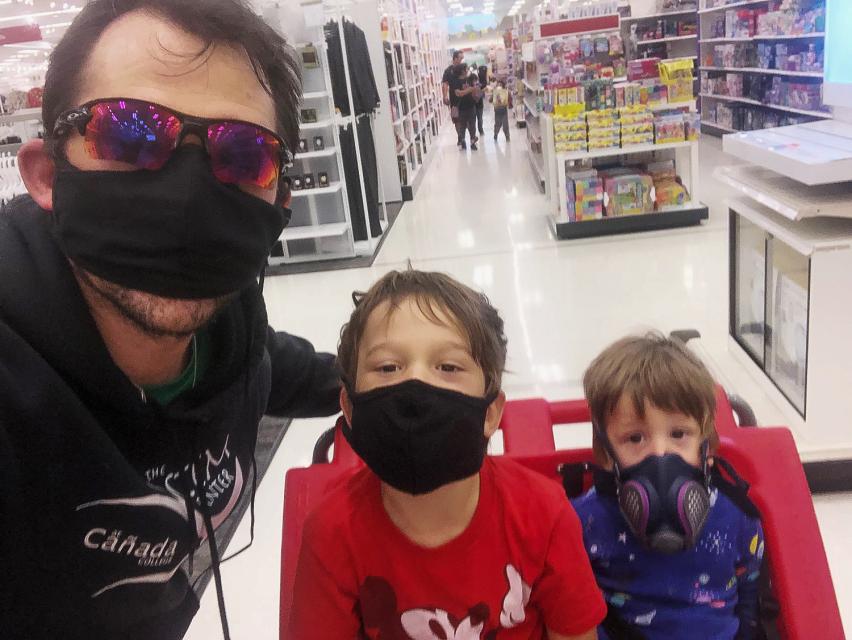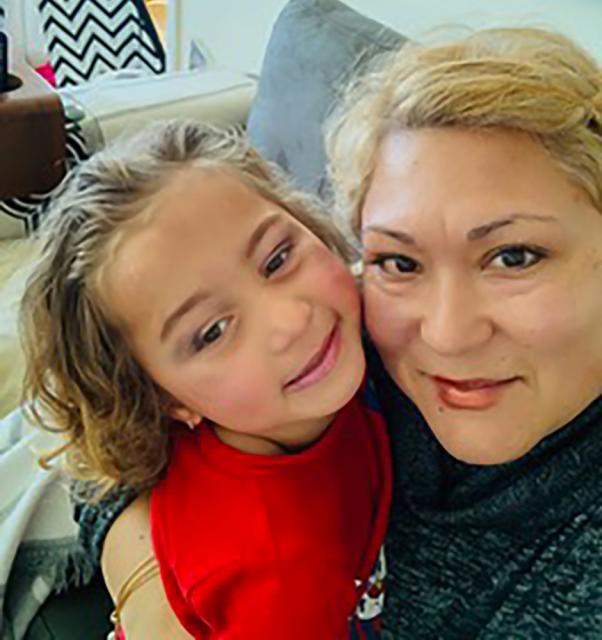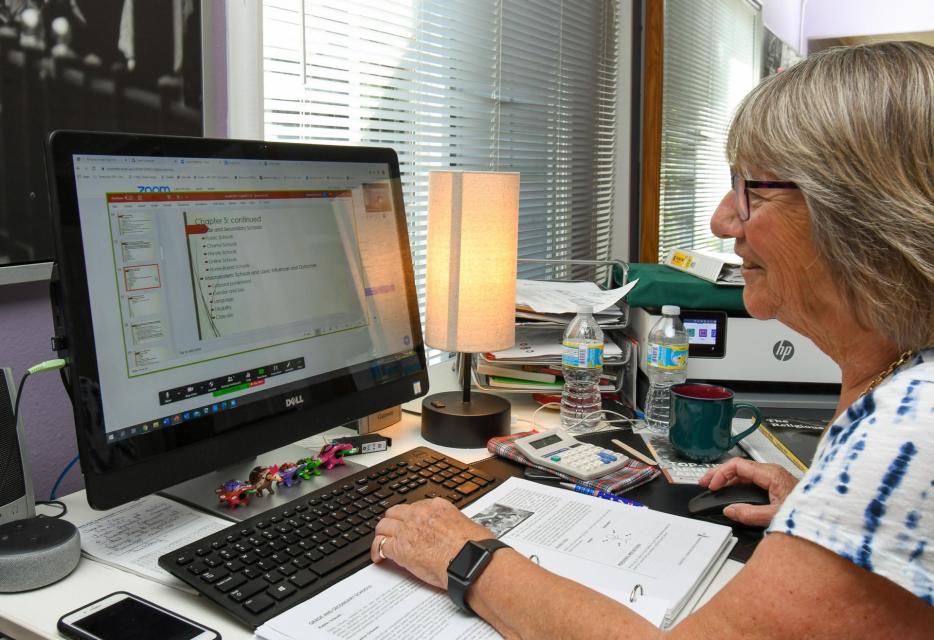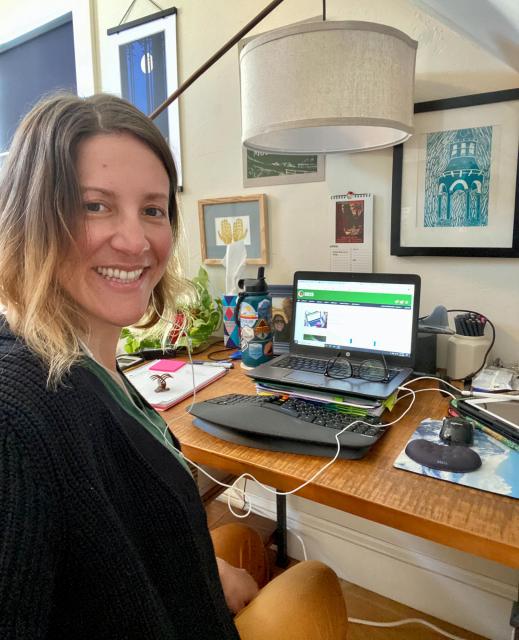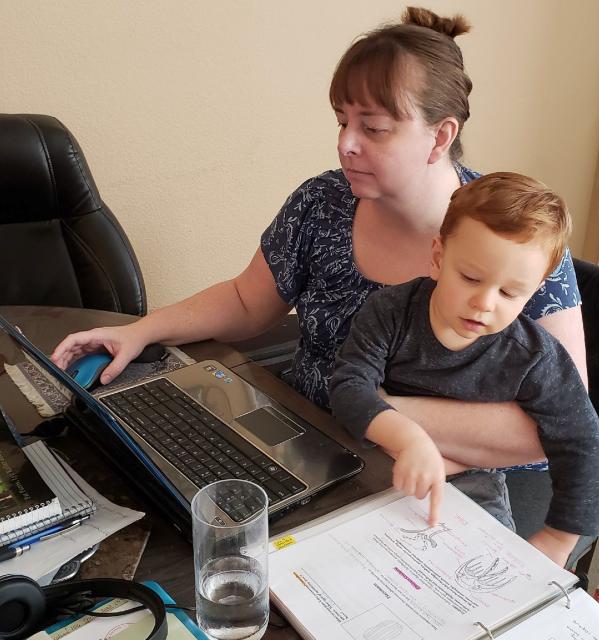By Katharine Harer, San Mateo Community College Federation of Teachers, AFT Local 1493
You’re teaching all your classes online, providing support to freaked-out students and dealing with a flood of emails every day, while at the same time, and often in the same room, hour after hour, your children need you to be present and available. You can’t send them to school or childcare or to the grandparents or to play at their friends’ houses. You can’t send them anywhere. Will lack of sleep, personal space and time make you trip and fall, and if so, who will catch you?
I asked a group of faculty parents across the district to open the doors of their homes, virtually of course, to share some of their experiences of parenting in this new and demanding time. It’s a private world, usually unseen, but one that I felt we need to hear about in order to understand and support one another. We’ll start with some of the challenges and move to some of the benefits, the unexpected positive outcomes of working and parenting while sheltered-in-place.
Work space, family space, same space
Faculty homes have become our offices, our virtual classrooms and our meeting spaces. The separation of work and home is a blur – untenable, impossible to achieve — especially when our children are locked-down in the house with us 24 hours a day.
“My husband works at the kitchen island, next to the rice cooker. I work at the kitchen table, usually next to Play-Doh, watercolors, Legos, and we might get a solid 10 minutes of work before our 5- and 2-year-olds need us for something. One of the hardest things is just never ever getting a break, help, or down time. My son has actually gotten really mad at me when I am working and cannot engage in an activity with him.” — Salumeh Eslamieh, Cañada College
“One day my husband was working from home and he had to help our daughter in the bathroom. He’d left lunch cooking on the stove, and our fire alarm went off and smoke filled our dining room/home office while I was in the middle of teaching a Zoom class.” — Soledad McCarthy, Skyline College
“The house is at times like a call center with everyone, instead of processing refunds for Amazon, is off being a student or teaching a class. Oliver will be discussing declensions in Latin in one room; Baxter offering interpretations of Othello in another; McKenna will be shut away in her room solving issues in programming; Heather, my wife, a librarian at Trinity School, will be reading books aloud to third-graders; and I’ll be trying to orchestrate discussions with my 105 students on how the pandemic is affecting those of us who are the most at risk during this time.” — Tim Maxwell, College of San Mateo
Work time, family time, same time
Balancing work, personal and family time was a challenge for most of us before shelter-in-place turned our lives upside down — taking student work home most nights, grading papers, quizzes, tests and homework — planning and prepping for classes, responding to our students’ emails, department emails, college emails and district emails. We were operating on all burners at the end of a long teaching day. It’s never been easy. Now the time conundrum is magnified.
“As a father of a beautiful, creative, active, and very social four-year old; as husband to a high achieving and higher-earning partner in a job that has little flexibility; and a son to an aging father who lives alone but not by choice, I’ve had to find ways to get work done in fits and spurts, around their schedules. I always feel behind. There simply aren’t enough hours in the day to meet the needs of students and family while still attending to my own health.” — Jesse Raskin, Skyline College
“Unfortunately, the pandemic has left many of us working much later than when we were not working from home. It has been difficult to communicate with people, who email us and expect responses, that we need a break from being available.” — Soledad McCarthy
“We are cut off from the community of adults who normally help to raise our children. We don’t get a break and this makes it very difficult for us to be productive in our jobs. This makes me understand how valuable childcare is to productivity in general, but also that I have to learn to balance being the sole educator of my children, in addition to being the parent every moment of the day. All of this puts a strain on my relationship with my partner because each of us has to negotiate getting any time to ourselves: either to work or to just do self care.” — Michael Hoffman, Cañada College
“I’m constantly negotiating with my essential worker partner about who can work when. There are almost no spare minutes. I feel the magnification of the pre-existing feeling that, as a working mother, I’m never able to put enough time into any one aspect of my multiple roles.” — Julie Carey, Cañada College
“It’s challenging for me to find the time to do my work. Between zoom meetings and my children’s needs, I am left with early morning and late at night to plan, grade, reply to lengthier emails, and correspond with my students. It is also difficult to attend meetings with two small children at home; I can’t be fully present for the meeting or for my kids and have often had to sacrifice my work for my children’s needs and vice versa. My husband is also zooming, teaching, and grading all day, and we often run into scheduling conflicts, causing one or both of us to give up on our professional responsibilities or our parental duties.” — Salumeh Eslamieh
“Screen time is like a giant frenemy”
We’re on our screens for more hours in the day than ever before, and our children are watching us. They want to do what we do — they want that screen too! They see how engrossed we are, our eyes riveted on our screens. And who hasn’t put their child in front of an educational TV show — for me it was Sesame Street and Mr. Rogers — or a fun computer game or YouTube? However, as educators we know how harmful it is to over-expose our kids to screens. I’d pry my son, Leo, off the screen and send him outdoors to ride his bike to his grandparents’ house or shoot hoops at the schoolyard. But we don’t have those options now, and the screen’s seductive powers are like quicksand.
“Screen time is a huge challenge. When both of us parents try to work, our children usually end up watching television. Unfortunately, my five-year-old acts like a crazed demon when we turn it off so it makes for lots of deregulated, difficult behavior. My two-year old isn’t really supposed to be looking at screens, but we made the mistake of letting him play a word/letter game on one of our phones. That provided us with some moments of relief, but now whenever either of us has our phone out, he begs to see it, even moving chairs across the house just to reach the phone on a shelf.” — Michael Hoffman
“Screen time is like a giant frenemy! It’s so convenient but does so much harm.” — Salumeh Eslamieh
Mourning the losses in our lives
As parents, we try to maintain some control over our emotions, but children test that resolve, and they do it over and over. It’s hard, maybe impossible, to be the model parent we imagine in our minds, especially now. And the losses for our children, and for ourselves, are real.
“I find myself mourning the loss of so many end-of-year experiences: celebrating students’ accomplishments in the same room with them, taking my children to the playground, listening to them giggle with friends on the schoolyard as the year draws to a close; sleepovers, dinners out, cousin parties…” — Julie Carey
“A month into the shelter-in-place, my role is to provide structure, encourage my children to stay engaged with school, and to make sure that individually they are doing well. Like most of our students, they too have had to make many adjustments; their daily routines have been uprooted. At-Home-Learning is primarily asynchronous, with no peer-to-peer classroom interaction, and assignments posted on Google Classroom. They are missing their friends and being able to participate in school activities. They miss being able to go to the movies or the mall or going hiking in the park. They will miss out on summer opportunities, like getting their first job or driver’s license.” — Jacquie Escobar, Skyline College
“I am so tired of hearing myself say the same things over and over again. Sounds of my voice are coming out that I have never heard before!” — Salumeh Eslamieh
Family discoveries, joys of togetherness
Faculty parents responded with an outpouring of positives about the new discoveries they’ve made during the past six weeks spent hanging out with their children: introducing new skills, like potty training, helping their kids with their schoolwork, and the unexpected pleasure of longer periods of less splintered time.
“Every morning I have to come up with creative ways to do art, music, and athletic activities. It’s me v. YouTube when it comes to Hannah’s day, and I’m determined to win. Yesterday, I taught her to climb trees. Three branches up, she turned to me and said, “Papa, I’m so proud! I didn’t know I could do this! Four branches up, we found a bird’s nest and had a lengthy discussion about the best materials to use to make our own nest. Three branches down, she decided she wanted to jump off, which she did, with grace, agility and the knees of youth. Then we ate cheddar bunnies.” — Jesse Raskin
“There’s more sibling closeness. My son told his sister today, “I feel so safe when I’m with you. Like nothing bad can happen.” And being so intimately involved in the education of my children (such a luxury!) We built a cardboard city as a set for a book series about “John the Rock Scientist” that my 7-year old is working on. And even though I’m still up at 5:30 am, I’m not running out on my children at 7 am, and I’m not also gone two evenings.” — Julie Carey
“We work hard on making the most of the time we have together. In fact, I would even say this past month of lockdown has been, in some ways, a lovely opportunity for us all to reconnect in ways we wouldn’t have were we following our pre-pandemic patterns in our various remote locations. I am so grateful to Heather, my creative and energetic wife. Each morning, she poses a Barbie doll dubbed «Corona Barbie» on the kitchen counter with an index card announcing an activity for the day. These activities have included three Bingo nights, several scavenger hunts, movie nights, Yahtzee nights, video game dance parties and family cleaning days.” — Tim Maxwell
“I am realizing how little attention I had to pay to my children during a normal workweek. We have done some really great projects together and, in the process, I have learned a lot about who my children are. We are now able to potty train the 2-year-old because we can actually watch him all day. Overall, there’s some relief in the sense that there’s nowhere to get to. I enjoy the aspect that makes us slow down and forces us to just focus on home and family. I’ve also realized how important childcare workers and teachers are — we take for granted the people who allow us to do our jobs during the day while we entrust our children to others. It also highlights to me how we are normally racing around, and our hectic pace of life is driven by a stressful and irrational capitalism.” — Michael Hoffman
“We have almost every meal together, and we have been playing with our kids, teaching them academic and life skills, doing crafts, and engaging in their curriculum development. My husband taught our 5-year old son how to ride a two-wheeler, and we have the time to let our kids help cook many of our meals and participate in doing more chores. We put on 80s music and clean up at “ninja-speed!” A kind friend is a music teacher, and we started Zoom piano lessons for our son to help her out and give him something new to learn, but thanks to that I am learning to read notes and play the piano as well! My son and daughter are becoming better playmates, and we are letting our kids get bored (they become monsters) and then get creative! We see and talk to our neighbors more, and our little yard is getting a lot of love. I also finally have time to potty train my 2-year old.” — Salumeh Eslamieh
Towards an environmental awakening
Finally, faculty parents shared their thoughts about some of the benefits of living in a quieter, less polluted, less frenetic environment.
“I’ve been given the opportunity to reconsider what my priorities are and how I want to live my life…. I’ve spent hours at night daydreaming of what a world could be like if we all decided not to drive every day, to let the office buildings go to dust and replace them with parks and cafes.” — Jesse Raskin
Once we resume our “normal” lives, what will we carry with us from this period? Can we achieve more balance in our typical work-family schedules? Will we remember what it felt like to spend so much time during the day with our children? Will we return to driving too much, running from place to place, over-scheduled, over-worked, reaching out with octopus arms to be there for everyone who needs us? Will we take the time to give our little ones tree-climbing lessons or sit at the piano learning songs together or building a make-believe universe out of cardboard?
“For each of the past five weeks, I’ve spent one morning at the beach with Hannah, my daughter. Together, we laugh, dance in the sand, play in the waves, eat carrots and apples, watch birds, collect shells, and luxuriate in the open expanse of dune and time. No experience I have ever had at work is as meaningful, free, or transcendent.” — Jesse Raskin
Thank you to the brave and extraordinary parents who contributed
their experiences to this article, who opened the doors of their
homes and allowed us inside.
Katharine Harer is Vice President & Outreach Organizer for the San Mateo Community College Federation of Teachers, AFT Local 1493. She is also mom to a 35-year-old son, Leo.

